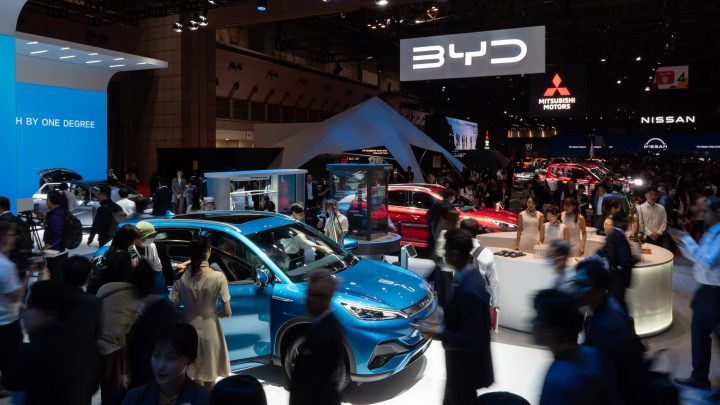
China could be on track to dominate the world’s EV market, even if not in the U.S.
China could be on track to dominate the world’s EV market, even if not in the U.S.

There’s a new frontrunner in the clean vehicle race, and it’s a brand Americans might not have heard of. Chinese automaker BYD — a company, by the way, backed by Warren Buffett — announced its sales results for the end of the year Monday.
While BYD sells both hybrids and pure electrics, the company likely beat Tesla in total vehicle sales last year, which would make it the global leader in what the Chinese call “new energy vehicles.” That’s largely thanks to sales inside China — the world’s biggest auto market.
About 1 of every 3 cars sold in China is an EV, and the competition is fierce. There are dozens of major brands making big ones, small ones, luxury ones and very cheap ones, with the lowest price tag coming in at around $10,000, said Tu Le of Sino Auto Insights.
“What I would like to clear up is that these products from the Chinese brands are, like, cheap. As in, they’re, like, knockoffs. And that’s not the case,” he said.
Right now, none of these brands is sold in the U.S. But bigger names like BYD and Nio have been pushing into Asia, South America and Europe.
“If I was an American car manufacturer CEO, I’d be trembling in my boots,” said Eswar Prasad, an economist at Cornell.
He said China’s electric vehicle industry has grown so fast in the last decade or so thanks to a lot of government subsidies. China has offered consumers incentives and supported manufacturers, sometimes indirectly.
“So for instance, the Chinese state-owned banks have been willing to provide credit to EV manufacturers at relatively low interest rates,” Prasad said.
The European Union is now investigating those advantages and may levy higher tariffs in the future.
In the U.S., a 27.5% tariff on Chinese cars has kept them out of the market. That’s not likely to change, said Sam Abuelsamid at Guidehouse Insights.
“It will be challenging for Chinese companies to really gain a lot of traction in the U.S. market, at least probably through the remainder of this decade,” he said.
Rules in the Inflation Reduction Act are making it increasingly difficult for any automaker using Chinese components to qualify for all-important consumer tax credits, like that $7,500 you can take off the sale price.
And Abuelsamid said the more China comes to dominate the global EV market, the harder it will be for carmakers to compete for those materials.
There’s a lot happening in the world. Through it all, Marketplace is here for you.
You rely on Marketplace to break down the world’s events and tell you how it affects you in a fact-based, approachable way. We rely on your financial support to keep making that possible.
Your donation today powers the independent journalism that you rely on. For just $5/month, you can help sustain Marketplace so we can keep reporting on the things that matter to you.

















